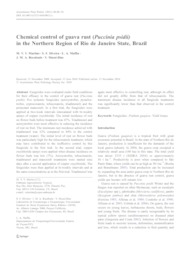Chemical control of guava rust (Puccinia psidii) in the Northern Region of Rio de Janeiro State, Brazil.
Chemical control of guava rust (Puccinia psidii) in the Northern Region of Rio de Janeiro State, Brazil.
Author(s): MARTINS, M. V. V.; SILVEIRA, S. F.; MAFFIA, L. A.; ROCABADO, J. M. A.; MUSSI-DIAS, V.
Summary: Fungicides were evaluated under field conditions for their efficacy in the control of guava rust (Puccinia psidii); five systemic fungicides (azoxystrobin, pyraclostrobin, cyproconazole, tebuconazole, triadimenol) and the protectant mancozeb. In a first trial, the fungicides were applied at two-week intervals intercalated with bi-weekly sprays of copper oxychloride. The initial incidence of rust on flower buds before treatment was 47%. Triadimenol and azoxystrobin were most effective in reducing the incidence of rust on fruit. The minimum rust incidence achieved with triadimenol was 12% compared to 84% in the control treatment (water). The initial level of rust on flower buds was particularly high for the tebuconazole treatment, which may have contributed to the ineffective control by this fungicide in the first trial. In the second trial, copper oxychloride sprays were applied when disease incidence on flower buds was low (7%). Azoxystrobin, tebuconazole, triadimenol and mancozeb treatments were started nine days after a second application of copper oxychloride. The fungicides were then applied at bi-weekly intervals and at the same concentrations as in the first trial. Triadimenol was again most effective in controlling rust, although its effect did not greatly differ from that of tebuconazole. The maximum disease incidence in all fungicide treatments was significantly lower than that observed in the control treatment.
Publication year: 2011
Types of publication: Journal article
Keywords: Psidium Guajava, Yield losses, fungicides
Observation
Some of Embrapa's publications are published as ePub files. To read them, use or download one of the following free software options to your computer or mobile device. Android: Google Play Books; IOS: iBooks; Windows and Linux: Calibre.
Access other publications
Access the Agricultural Research Database (BDPA) to consult Embrapa's full library collection and records.
Visit Embrapa Bookstore to purchase books and other publications sold by Embrapa.

